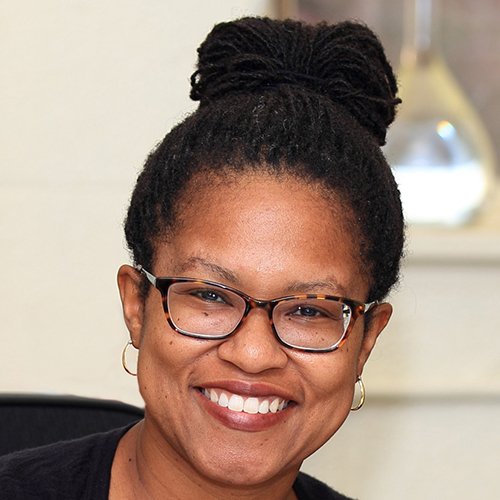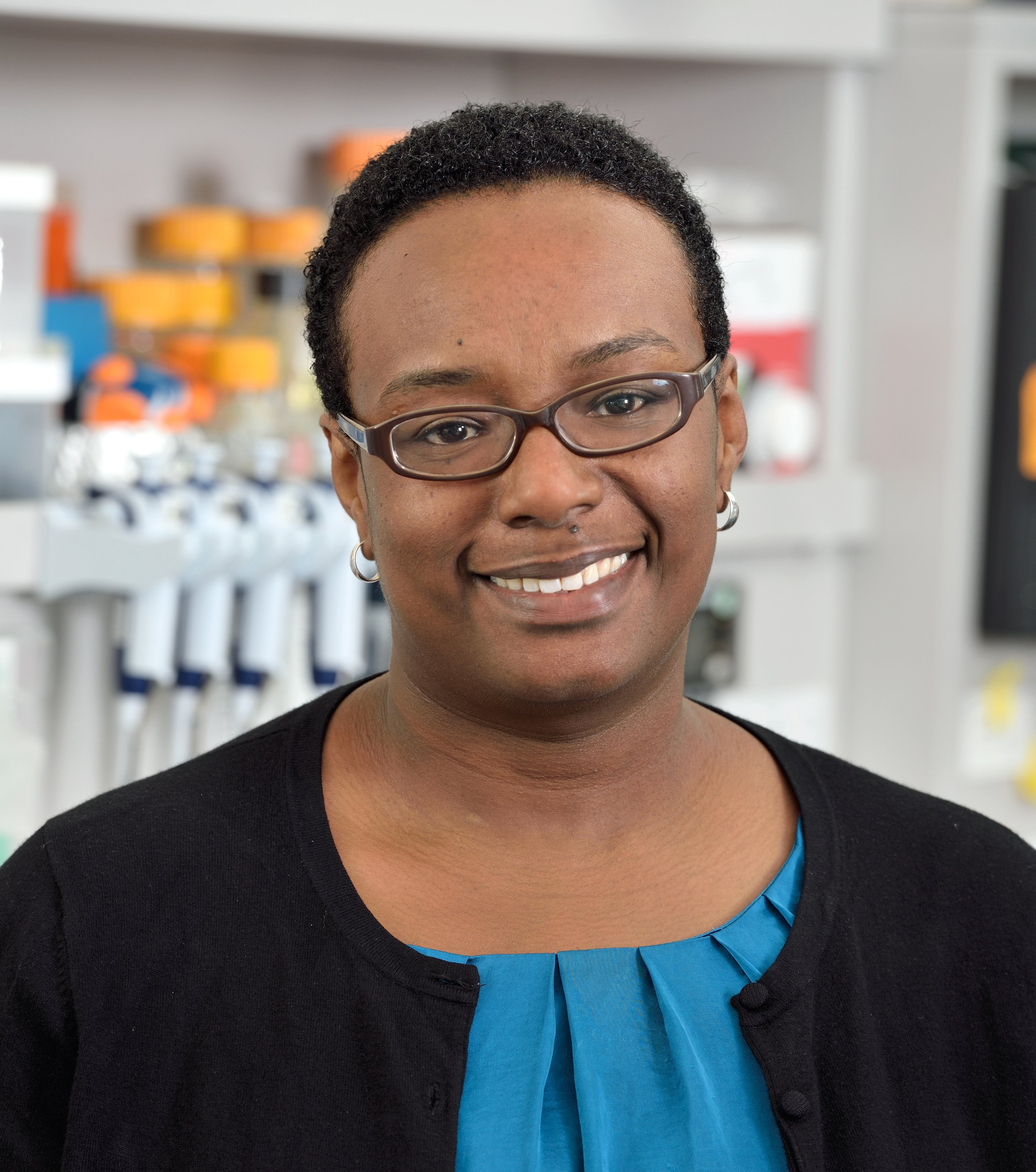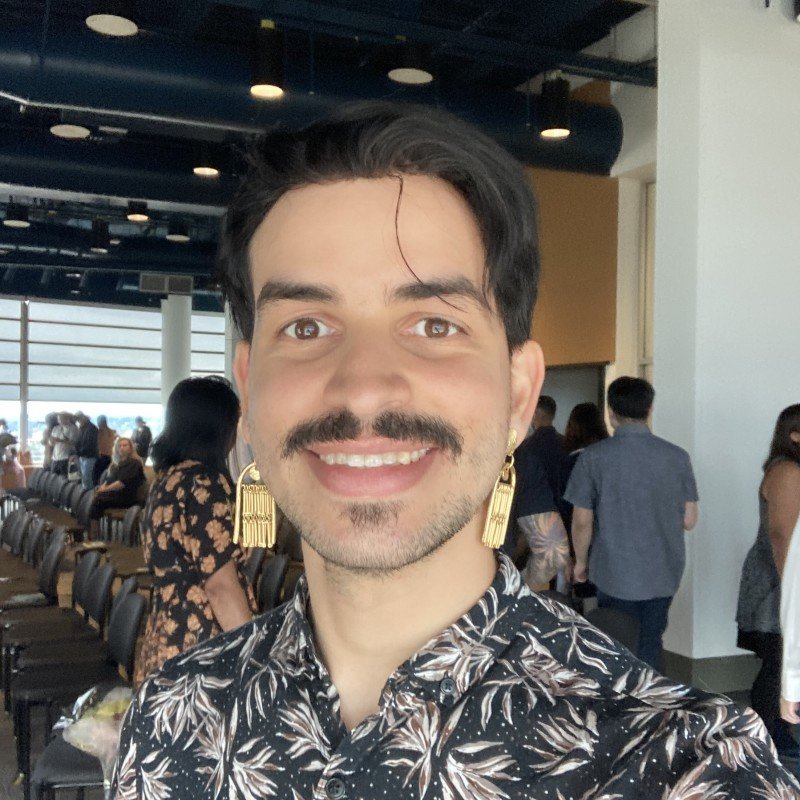Four scientists honored for their Excellence in Supporting Diversity, Equity, Inclusion & Belonging (DEIB) in the Arabidopsis Community
The North American Arabidopsis Steering Committee (NAASC) is deeply committed to the development, participation and recognition of Arabidopsis researchers from historically marginalized backgrounds. In 2023, NAASC established an award for Excellence in Supporting Diversity, Equity, Inclusion & Belonging (DEIB) in the Arabidopsis Community. The award recognizes members of the community who have made significant impacts in several areas which may include mentoring, supporting, training, and/or advocating for others that are members of under-represented communities. While awardees may or may not be members of a marginalized group, all serve as role models for our community.
The following four awardees, two early career (graduate student or postdoctoral scholar) and two later career (faculty and other non-trainee positions) were selected based on support letters written by colleagues, former or current mentors and mentees. The later-career recipients (Dr. Long and Dr. Montgomery) will give invited presentations on the first day (July 15th) of the International Conference on Arabidopsis Research, while the early-career recipients (Dr. Ramos Báez and Dr. Madison) will give invited presentations on the final day (July 19th), 2024 in San Diego, California, USA.
Terri Long, North Carolina State University (NCSU)- Later Career Category
Dr. Terri Long, is a professor at North Carolina State University. Dr. Long’s research is focused on the mechanisms of iron uptake and transport in Arabidopsis and other plants. Dr. Long has been a steadfast leader in efforts of diversity and inclusion in the Arabidopsis community, most visibly for conceptualizing, funding and directing the Inclusivity Scholars Program (ISP), which promotes the participation of scientists of underrepresented backgrounds at ICAR. Her effective leadership and mentoring have led to real contributions to the development of future STEM capacity and leadership amongst scientists of all identities in the Arabidopsis community.
"Dr. Terri Long has been and continues to be a leader in advancing diversity, equity, inclusion and belonging in the Arabidopsis community. She is the nucleus for highly successful efforts within NAASC in DEIB that make it a representative for other academic communities as to what they SHOULD do. Dr. Long was a co-chair of the NAASC Minority Affairs Committee from 2013 to 2022. She put together a program to fund Under-Represented Minority/Inclusivity Scholars including: recruitment of applicants, scholar selection, organizing a program focused on development of a cohort of under-represented scientists within the Arabidopsis community (~75 since 2013). This program included activities to foster relationships and networking between cohort members both within the meeting and beyond, discussion of their research, a safe space to discuss challenges unique to this group, targeted opportunities to meet with NAASC members and funding agencies. In addition, meetings were set up between scholars and scientists of their choosing who they wished to meet with regarding their research or future career opportunities. These activities took place at all ICAR meetings since Vancouver in 2014 and still ongoing. I have watched scientists trained by this program go on to flourish in a range of scientific careers – from academia to industry, teaching and non-profit careers. Dr. Long’s promotion of DEIB equity, inclusion and belonging within other programs and roles represent an extraordinary number of hours that she tirelessly gives, behind-the-scenes for plant biology in general. Finally – Dr. Long is herself an African-American female scientist who grew up in a very small and rural farming community. Over four decades she has often been not only the only woman in the room but also the only person of color. She is of course a role-model for African-American North Carolinians, Americans and internationally – so many scientists of color. What is not quantified is the weight that this position as role-model has on scientists like Dr. Long. Without her, our Arabidopsis and plant biology community would look much different. Receipt of this award wouldn’t be enough to compensate for all that she has done for us, but it would at the very least be recognition on behalf of all of us." - Letter Writer for Dr. Terri Long
"To build community, since 2020, Dr. Long initiated and organized the “Black Women in Plant Biology Conclave”, an informal international group of 15-20 female faculty in Academia dedicated to providing a safe space, support, discussions on academic and professional inequities, and strategies on solutions to sustain and increase inclusion of black plant scientists. Furthermore, I know that throughout the pandemic, Dr. Long made sure to frequently check in with BIPOC STEM scientists. These thoughtful gestures had a huge impact on the continued sense of belonging for many of us who otherwise felt isolated. In summary, Dr. Long's commitment and continued efforts to increase diversity enhance inclusion and equity, and advocate for individuals traditionally excluded in STEM and specifically the plant sciences are impactful and noticeable. She is a brilliant scientist and a wonderful human being who has selflessly served the community and would truly value recognition of her efforts." - Letter Writer for Dr. Terri Long
Beronda Montgomery, Grinnell College- Later Career Category
Dr. Beronda Montgomery is a professor at Grinnell College, where she is also Vice-President of Academic Affairs and Dean. Her research focuses on mechanisms of photoadaptation, in plants and cyanobacteria. We recognize Dr. Montgomery for her long dedication to promoting diversity, equity, and inclusion in the Arabidopsis community, and for her efforts in mentorship and science communication. Her excellence in mentorship is evidenced by her continuous involvement and successful contributions to many advisory boards, graduate programs, and committees, in many national and international scientific societies.
"Dr. Montgomery has been a role model for the way she centers her activities on the needs of marginalized individuals. She has changed the way I and many others see mentorship. She moved from traditional deficits models that focus on what is wrong with the mentee, to a nurturing model that focus on ways to improve the environment and institutions to ensure that each individual can be successful. Her philosophy on mentorship is presented in detail in “Lessons from Plants”, her book on mentorship that has become a best-seller and a must-read for anybody interested in mentoring, inclusivity, and leadership. In leadership positions, "Dr. Montgomery has worked to transform societies to remove participation barriers and injustice. At a personal level, she has dedicated enormous amount of time to mentor and promote individuals from vulnerable groups. She has become a guiding figure for those that want to achieve institutional change and promote a more just society (I have heard “what would Beronda do” many times in meetings). While her impact is evident in the Arabidopsis and plant science communities, she is also recognized and praised in other professional societies." - Letter Writer for Dr. Beronda Montgomery
"Dr. Montgomery instilled in me a profound appreciation for a research career. Her guidance and encouragement propelled me to pursue further opportunities in molecular biology labs ultimately shaping my decision to pursue a Ph.D Dr. Montgomery's tireless dedication to promoting diversity, equity, and inclusion in the scientific community has been evident through her keynote speeches at prestigious conferences like the Annual Biomedical Research Conference for Minoritized Scientists (ABRCMS), her inspiring presentations at minority-focused organizations such as the Black Microbiologists Association, and through her written work, notably her illuminating book "Lessons from Plants." Dr. Montgomery's exemplary commitment to fostering an inclusive environment in science has served as a guiding light for countless aspiring scientists, particularly individuals from underrepresented backgrounds."- Letter Writer for Dr. Beronda Montgomery
Román Ramos Báez, University of Chicago - Earlier Career Category
Dr. Ramos Báez earned his Ph.D. at the University of Washington where he conducted research on plant responses to hormones. He is currently continuing this line of research as a Chicago Fellow at the University of Chicago. Service and outreach have been an integral part of Dr. Ramos Báez’ growing career and his activities have already impacted the Arabidopsis community in meaningful ways. From advocating for the importance of plant biology research to addressing issues faced by queer and trans members of the Arabidopsis community, he has been an advocate and leader encouraging scientists from historically excluded backgrounds to participate in and disseminate their Arabidopsis research.
"Dr. Baez is an outstanding plant biologist and a truly brilliant scientific ambassador, communicator, and activist. His record of scientific outreach is extraordinary in its depth, effectiveness, and creativity. What Román has accomplished would be remarkable for any scientist, but it is thoroughly stunning given his early career stage. Román’s work to disseminate scientific knowledge about plant biology is inseparable from his efforts to foster diversity, equity, inclusion and belonging in science. For example, during his graduate work as an HHMI Gilliam Fellow, Roman initiated and organized a Black Leaders in Plant Biology Seminar Series. Each invitee presented both an academic seminar on their research in plant molecular biology/physiology and an equally in-depth talk on their outreach/community/education efforts and their perspectives on science and society. This effectively advanced several mutually reinforcing goals: to showcase cutting-edge research in plant biology for the larger biology community at UW, to provide a platform for black plant biologists to advance their reputations, careers, and professional networks, and – for students and postdocs in the UW community -- to showcase Black scientist role models, to provide opportunities to make new professional connections, and to create an environment that celebrates scientists from historically excluded backgrounds and identities. In all his work, Román is extraordinarily effective at making everyone feel invested, welcomed and celebrated. He has a gift for identifying and revealing connections that draw people in as allies. I see this gift in Román’s scientific talks – which draw surprising connections and analogies between scientific disciplines and between those disciplines and society – thus making the work unusually accessible and interesting. And it is especially apparent in his outreach and advocacy work: Román has an incredible ability to gently draw in not only those who are members of a focal identity group but also the “outsiders,” who typically end up understanding, relating to, and feeling invested in the issues being addressed. This is the foundation of Román outreach work, which builds rich connections between scientists in different disciplines, between people of different backgrounds and identities, and between people inside and outside of science." - Letter Writer for Dr. Román Ramos Báez
"Dr. Báez is an exceptional human being and biologist, well on the way to fulfilling their outstanding promise to become a science leader. Dr. Báez has specifically served the Arabidopsis community in multiple ways. The most notable examples include: 1) advocating for the importance of plant biology research as an HHMI Gilliam Fellow; 2) co-developing and co-facilitating a workshop at ICAR2021: Addressing Taboo Issues to Increase Queer and Trans Recruitment and Retention; 3) advocating for a change in demographic data collection by HHMI and federal agencies (Nonbinary Scientists Want Funding Agencies to Change How they Collect Gender Data, Scientific American, 30 Aug 2021); 4) leading the Front & Center Project for the past year on behalf of NAASC and ASPB; 5) producing a series of videos and blog posts about navigating graduate school as someone who is gender expansive (YouTube, Sensitive Roots). They are also a role model, as a rare Latine, non- binary, queer, bilingual, immigrant plant synthetic and evolutionary biologist. Dr. Báez was also a powerful advocate for the intersection of plant science and equity within the Seattle community during their PhD. They were a co-founder of GLADE (Graduate-Led Action on Diversity and Equity) which assembled a substantive list of action items to improve equity and inclusivity in the UW Biology Department, they ran an outreach booth filled with Arabidopsis plants at a local art festival, and performed as a bilingual drag queen with Entre Hermanos on a webinar to explain why participating in the census matters. They also performed plant biology-rich drag at Seattle PRIDE 2021 and in the international on-line series Science is a Drag. In all of these contexts (and more), Dr. Báez brings a wealth of qualities I yearn to see embraced more widely in the world—compassion, optimism, curiosity, dedication, resilience, humor, seeing the humanity in everyone. They are a leader in a new mold—happiest when they empower others, someone who rejects hierarchies and binaries of all kinds." - Letter Writer for Dr. Román Ramos Báez
Imani Madison, North Carolina State University (NCSU)- Earlier Career Category
Dr. Imani Madison earned her Ph.D. from North Carolina State University (NCSU) where she took interdisciplinary approaches to solve problems in plant biology, such as understanding the regulation of iron nutrition. She currently continues using these innovative approaches as a postdoctoral fellow at NCSU. Dr. Madison’s dedication towards fostering a strong and inclusive community of scholars is humbling. While only a graduate student she co-founded and co-directed Front and Center (with Dr. Edith Pierre-Jerome) and helped ASPB and NAASC develop the Changing Cultures and Climates Initiative to support marginalized plant scientists. She continues to mentor and support undergraduate students from minoritized backgrounds and engage in countless outreach activities.
"Dr. Madison builds and cultivates networks of peers which enhance student sense of belonging in academia. Early on she was engaged with the Plant Biology Graduate Student Association where she served in several roles including president. She and her colleagues organized social activities that without a doubt had an impact in the mental health of our students during the pandemic. She was also part of a DIY Maker group, a team of students that designed a winning plant-growth device for space exploration and was recognized by NASA. The Maker group is a community of students and postdocs who learn from each other as they build microcomputer-controlled gadgets for research. Many students of color develop feelings of isolation in academia and have negative experiences that may lead them to leave. With the goal of supporting these students, Dr. Madison founded and directed the Adventitious Roots Discord server in 2020. This effort was built within the larger Changing Cultures and Climate Initiative at NAASC of which she was an active contributor. Adventitious Roots is a space for networking and support that serves Black, Indigenous and Latine students. Because of its private nature - a requirement to make it a safe space for students- it may be difficult to measure the real impact of these activities. But without a doubt the interaction and support that the students are creating are urgently needed for retention of students of color in our field. That Dr. Madison initiated this group at the most challenging time of our generation, and just before she was about to graduate, it is a testament to her dedication towards fostering a stronger community of scholars that include everyone." - Letter Writer for Dr. Imani Madison
"I believe it is crucial to highlight not only Dr. Imani's scientific achievements but also her exceptional commitment to diversity, equity, inclusion, and belonging (DEIB) within our academic community. Imani's efforts in mentoring students exemplify her commitment to promoting diversity in STEM. She has actively worked towards creating an inclusive environment, encouraging collaboration, and sharing knowledge with students from diverse backgrounds. Moreover, in addition to her scientific contributions, Imani has undertaken community service projects that serve to educate the public about science. Her dedication to outreach reflects not only her passion for science communication but also her commitment to making scientific knowledge accessible to a broader audience, irrespective of background or identity. Imani's interdisciplinary approach to problem-solving is not only limited to her research but also extends to fostering a diverse and inclusive scientific community. Her collaborative and supportive nature ensures that every member of our lab, regardless of experience level, feels valued and heard."- Letter Writer for Dr. Imani Madison
NAASC developed Arabidopsis Community awards in 2023 with inaugural awardees announced in 2024. The Excellence in Supporting DEIB in the Arabidopsis Community awards are given for demonstrated commitment to in 1+ areas:
Outreach Activities/Initiatives for DEIB
Communication for DEIB
Service for DEIB
Mentorship and/or Advocacy for DEIB
Nominees were evaluated by a NAASC subcommittee based on (1) Nomination letter(s); (2) Nominee CV, (3) optional Nominee statement; and (4) Letters of support. In 2024, four awardees were selected, two in the early career (graduate student or postdoctoral scholar) category and two in the later career (faculty and other non-trainee positions) category.
Awardees are invited to give a talk at ICAR 2024-San Diego (15-19 July).




